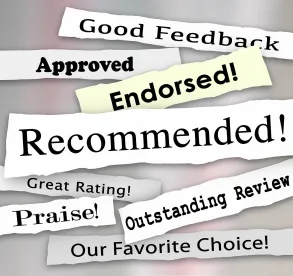The agency last published full guidelines for advertisers using reviews and endorsements in 2009.
The Federal Trade Commission (FTC) has news for advertisers: for internet and social media disclosures to be effective, they must be “unavoidable.”
On June 29, the FTC released final revised Endorsement Guides, the first full-scale revision in 14 years. The newly updated Endorsement Guides, which address best practices and deceptive advertising pitfalls, reflect a changed media landscape: at least 72 percent of adults in the United States now use social media sites, a considerable jump from the single-digit scrolling recorded earlier in the new millennium, according to the Pew Research Center. Today, consumers of all ages regularly interact with advertisers across a variety of platforms and through a combination of audio, video and written content.
Mindful of the complexity of ensuring transparency across evolving channels, the FTC has also edited its popular FTC’s Endorsement Guides: What People are Asking, a compendium of user queries and agency responses last revised in 2017. The document includes guidance on 40 new questions and numerous updates to previous agency recommendations.
New Endorsement and Testimonial Guidance
In the updated Guides and related compendium, the FTC expounds on various key issues for advertising professionals, influencers and brands, including (1) a new standard regarding “procuring, suppressing, boosting, organizing, publishing, upvoting, downvoting, reporting or editing consumer reviews,” (2) incentivized reviews, employee reviews and fake reviews, (3) the “clear and conspicuous” disclosure standard, including the built-in disclosure feature of certain platforms, (4) the definition of “endorsement,” (5) the role of advertisers, endorsers and intermediaries in the endorsement landscape, and (6) advertising directed at children. Here are some highlights and insights from both the updated Guides and FAQ compendium:
The misleading presentation of consumer product or service reviews on the web.
-
Advertisers should do nothing that results in the distortion or misrepresentation of what consumers think of their products, whether by “procuring, suppressing, boosting, organizing, publishing, upvoting, downvoting or editing consumer reviews,” regardless of whether the reviews meet the definition of “endorsements” under the Guides.
-
A manufacturer that forwards only favorable reviews for its product to a third-party review website or omits unfavorable reviews is engaging in a misleading practice.
-
A manufacturer that regularly flags negative reviews of its products as fake without a reasonable basis for believing they are fake is engaging in an unfair or deceptive practice.
Deception surrounding the expertise or affiliation of a reviewer.
-
Endorsers must have exercised the expertise that they are “represented” as possessing. For example, an endorser of a hearing aid who is presented as a “doctor” should be a medical doctor with substantial experience in audiology or a non-medical doctor with a doctorate degree in audiology. Doctors without the relevant audiology experience might be able to endorse the product, but only with a disclosure clarifying the nature and limits of their expertise.
-
Consumers may perceive the connection between a retailer and its employees as relevant when reading reviews by those employees, even when the reviews are of products the retailer sells but does not manufacture.
The meaning of “clear and conspicuous” disclosure.
This section of the Guides codifies standards we have increasingly seen in FTC Orders.
-
For online disclosures to be effective, they must be unavoidable.
-
If a disclosure is not visible without the viewer having to click “more,” then the disclosure is not unavoidable and thus is not clear and conspicuous. Also, built-in disclosures on certain platforms may not be unavoidable, depending on placement, readability and clarity.
-
On TikTok, a disclosure in the text description of the video is insufficiently conspicuous, given the platform’s reliance on audiovisual content.
-
The hashtag #sweepstakes is, on its own, vague, and a proper disclosure should include the name of the company promoting the sweepstakes.
The definition of “endorsements” in the context of today’s social media.
-
Tags and certain other types of communications can be endorsements.
-
Fake positive reviews used to promote a product are endorsements.
-
If an influencer receives a valuable, unsolicited product and is asked, but not required, to endorse the product, any resulting social media posts are endorsements.
Liability of advertisers, endorsers and intermediaries.
-
An advertiser is responsible for and must monitor the actions of its endorsers, even absent a contractual relationship between the endorsers and the advertiser.
-
Endorsers may be liable for their statements, including falsely representing that they have used a product or experienced a service.
-
Intermediaries, such as public relations firms or reputation management companies, may be liable for their role in creating ads containing endorsements they know, or should know, are deceptive.
Risks related to advertising targeting children.
-
Practices that “would not ordinarily be questioned in advertisements addressed to adults” might face special scrutiny when directed to children, as research suggests children are not always capable of fully understanding disclosures.
Proposed Rule on Consumer Reviews
The FTC plans to publish a Proposed Rule on the Use of Consumer Reviews and Testimonials, based on comments received in response to a November 2022 Advanced Notice of Proposed Rulemaking. As a Rule, the proposal spells out illegal practices and authorizes courts to impose civil penalties of more than $50,000 per violation. The Rule proposes to cover the following:
-
Selling or obtaining fake consumer reviews and testimonials. It would prohibit businesses from writing or selling consumer reviews or testimonials by someone: 1) who doesn’t exist, 2) who didn’t have actual experience with the product or service, or 3) who misrepresented their experience. It also would prohibit businesses from procuring reviews or disseminating testimonials from those same three categories.
-
Review hijacking. It would ban using or repurposing a consumer review written for one product so that it appears to have been written for a substantially different product.
-
Buying positive or negative reviews. Businesses would be prohibited from providing compensation or other incentives contingent on the writing of consumer reviews expressing a particular sentiment, either positive or negative.
-
Insider reviews and testimonials. The proposed Rule would prohibit a company’s officers and managers from writing reviews or testimonials about its products without clearly disclosing their relationship. It also would prohibit businesses from disseminating testimonials by insiders without clear disclosures, and it would prohibit certain solicitations by officers or managers of reviews from company employees or their relatives.
-
Company-controlled review websites. Businesses would be prohibited from creating or controlling websites that claim to provide independent opinions about a category of products that includes their own products.
-
Illegal review suppression. Businesses would be prohibited from using unjustified legal threats, other intimidation, or false accusations to prevent or remove a negative consumer review. Also, if negative reviews have been suppressed, the proposed Rule also prohibits a business from misrepresenting that the reviews on its website represent all submitted reviews.
-
Selling fake social media indicators. The proposed Rule would prohibit businesses from selling false indicators of social media influence, such as fake followers or views. The proposed Rule also would bar anyone from buying such indicators to misrepresent their significance for a commercial purpose.
Advertisers, endorsers and intermediaries should take the time to review their practices and workflows to ensure compliance with these updated Guides, as all stakeholders in the endorsement ecosystem have a role to play in avoiding deceptive and misleading advertising.







 />i
/>i

